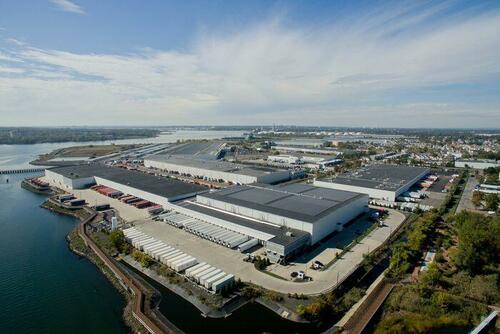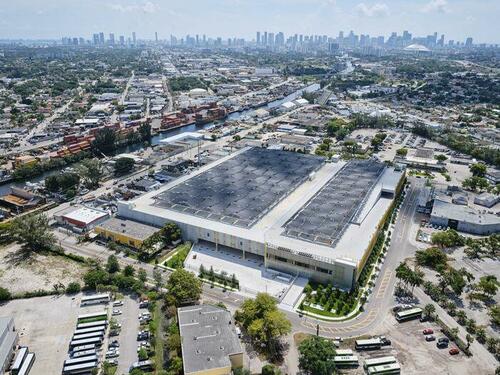
By Todd Maiden of FreightWaves
Logistics real estate operator Prologis announced Monday it entered into an all-cash agreement to acquire a $3.1 billion portfolio of warehouses and distribution properties from Blackstone, a sign that industrial space remains - along with rental housing - the strongest property type in the shaky commercial property sector.

The acquisition includes nearly 14 million square feet of space from various real estate funds held by Blackstone. The deal allows Prologis to expand its presence in key markets like Atlanta, Dallas, Las Vegas, New York/New Jersey and Phoenix. Sites in Southern California, the San Francisco Bay Area and South Florida are also included. Prologis will add 77 new customers and expand its relationships with 50 existing clients through the transaction.
The company plans to retain all of the properties acquired. Prologis, a REIT, is the world’s largest industrial property company with 1.2 billion square feet in 19 countries. Last year it acquired competitor Duke Realty in a $26 billion all-stock transaction, the largest commercial property deal since the pandemic began.
“These high-quality properties are complementary to our portfolio and fit perfectly into our long-term strategic plan for growth,” said Dan Letter, Prologis’ president. “The acquisition demonstrates our unique ability to add significant scale to our portfolio — expanding customer relationships and increasing opportunities for our growing Essentials platform.”

The deal price represents a 4% cap rate (net operating income divided by market value of property) in year one and a 5.75% cap rate when adjusting the leases in the portfolio to current market rents.
Prologis and Blackstone have engaged in more than a dozen transactions with each other over the last 11 years, a news release stated.
“Where you invest matters, and this transaction demonstrates the exceptional demand for high-quality warehouses,” said Nadeem Meghji, head of Blackstone Real Estate Americas. “With near record low vacancy, logistics remains a high conviction theme for us; we are proud owners of $100 billion of warehouses in North America and $175 billion in total around the world.”
Investment giant Blackstone is also a major investor in industrial real estate, with a global portfolio valued at $175 billion, and is continuing to buy warehouses and distribution centers. The assets it is selling to Prologis are held by Blackstone’s opportunistic funds, which typically sell properties after holding them long enough to see an increase in values.
Prior to this transaction, Prologis owned 1.2 billion square feet of logistics space across 19 countries.
While most commercial property types have been hurt by higher interest rates, which have greatly increased borrowing costs for developers and investors, industrial space has weathered the storm better than other property types such as office, which has gotten pounded by the increase of remote work in the pandemic era.
As the WSJ notes, demand for industrial space has remained strong thanks to the economic growth and the boom in online retail, which has required an overhaul of the supply chain. Nearly 60% of the portfolio being acquired from Blackstone by Prologis are properties in cities or close to consumers, which are prized by e-commerce tenants wanting to deliver packages to consumers within a few days.
While Amazon continues to dominate the e-commerce business, demand for industrial space also is increasing from numerous other online retailers. “We had 40 unique e-commerce users last quarter alone with Amazon actually being a small slice of that,” said Dan Letter, Prologis president, on an earnings call earlier this year.
Prologis has grown both by developing new properties and through acquisitions. Lately, the company has been focusing more on acquisitions because of rising construction costs and challenges in getting development approvals from local governments.
Prologis’ increasing size has enabled it to invest in a range of environmentally friendly businesses. The company is adding electronic-vehicle charging stations at some of its properties and putting solar energy panels on the sprawling rooftops of its warehouses and distribution centers.
Industrial property held by industrial property companies saw “solid market rent growth” in the first quarter, according to a May report on the sector by real-estate analytics firm Green Street. But the report noted that demand for industrial property might decline because retailer inventory levels rose during the first quarter and “retailers are expected to adopt a cautious approach toward inventory management for the remainder of the year.”
By Todd Maiden of FreightWaves
Logistics real estate operator Prologis announced Monday it entered into an all-cash agreement to acquire a $3.1 billion portfolio of warehouses and distribution properties from Blackstone, a sign that industrial space remains – along with rental housing – the strongest property type in the shaky commercial property sector.

The acquisition includes nearly 14 million square feet of space from various real estate funds held by Blackstone. The deal allows Prologis to expand its presence in key markets like Atlanta, Dallas, Las Vegas, New York/New Jersey and Phoenix. Sites in Southern California, the San Francisco Bay Area and South Florida are also included. Prologis will add 77 new customers and expand its relationships with 50 existing clients through the transaction.
The company plans to retain all of the properties acquired. Prologis, a REIT, is the world’s largest industrial property company with 1.2 billion square feet in 19 countries. Last year it acquired competitor Duke Realty in a $26 billion all-stock transaction, the largest commercial property deal since the pandemic began.
“These high-quality properties are complementary to our portfolio and fit perfectly into our long-term strategic plan for growth,” said Dan Letter, Prologis’ president. “The acquisition demonstrates our unique ability to add significant scale to our portfolio — expanding customer relationships and increasing opportunities for our growing Essentials platform.”

The deal price represents a 4% cap rate (net operating income divided by market value of property) in year one and a 5.75% cap rate when adjusting the leases in the portfolio to current market rents.
Prologis and Blackstone have engaged in more than a dozen transactions with each other over the last 11 years, a news release stated.
“Where you invest matters, and this transaction demonstrates the exceptional demand for high-quality warehouses,” said Nadeem Meghji, head of Blackstone Real Estate Americas. “With near record low vacancy, logistics remains a high conviction theme for us; we are proud owners of $100 billion of warehouses in North America and $175 billion in total around the world.”
Investment giant Blackstone is also a major investor in industrial real estate, with a global portfolio valued at $175 billion, and is continuing to buy warehouses and distribution centers. The assets it is selling to Prologis are held by Blackstone’s opportunistic funds, which typically sell properties after holding them long enough to see an increase in values.
Prior to this transaction, Prologis owned 1.2 billion square feet of logistics space across 19 countries.
While most commercial property types have been hurt by higher interest rates, which have greatly increased borrowing costs for developers and investors, industrial space has weathered the storm better than other property types such as office, which has gotten pounded by the increase of remote work in the pandemic era.
As the WSJ notes, demand for industrial space has remained strong thanks to the economic growth and the boom in online retail, which has required an overhaul of the supply chain. Nearly 60% of the portfolio being acquired from Blackstone by Prologis are properties in cities or close to consumers, which are prized by e-commerce tenants wanting to deliver packages to consumers within a few days.
While Amazon continues to dominate the e-commerce business, demand for industrial space also is increasing from numerous other online retailers. “We had 40 unique e-commerce users last quarter alone with Amazon actually being a small slice of that,” said Dan Letter, Prologis president, on an earnings call earlier this year.
Prologis has grown both by developing new properties and through acquisitions. Lately, the company has been focusing more on acquisitions because of rising construction costs and challenges in getting development approvals from local governments.
Prologis’ increasing size has enabled it to invest in a range of environmentally friendly businesses. The company is adding electronic-vehicle charging stations at some of its properties and putting solar energy panels on the sprawling rooftops of its warehouses and distribution centers.
Industrial property held by industrial property companies saw “solid market rent growth” in the first quarter, according to a May report on the sector by real-estate analytics firm Green Street. But the report noted that demand for industrial property might decline because retailer inventory levels rose during the first quarter and “retailers are expected to adopt a cautious approach toward inventory management for the remainder of the year.”
Loading…




